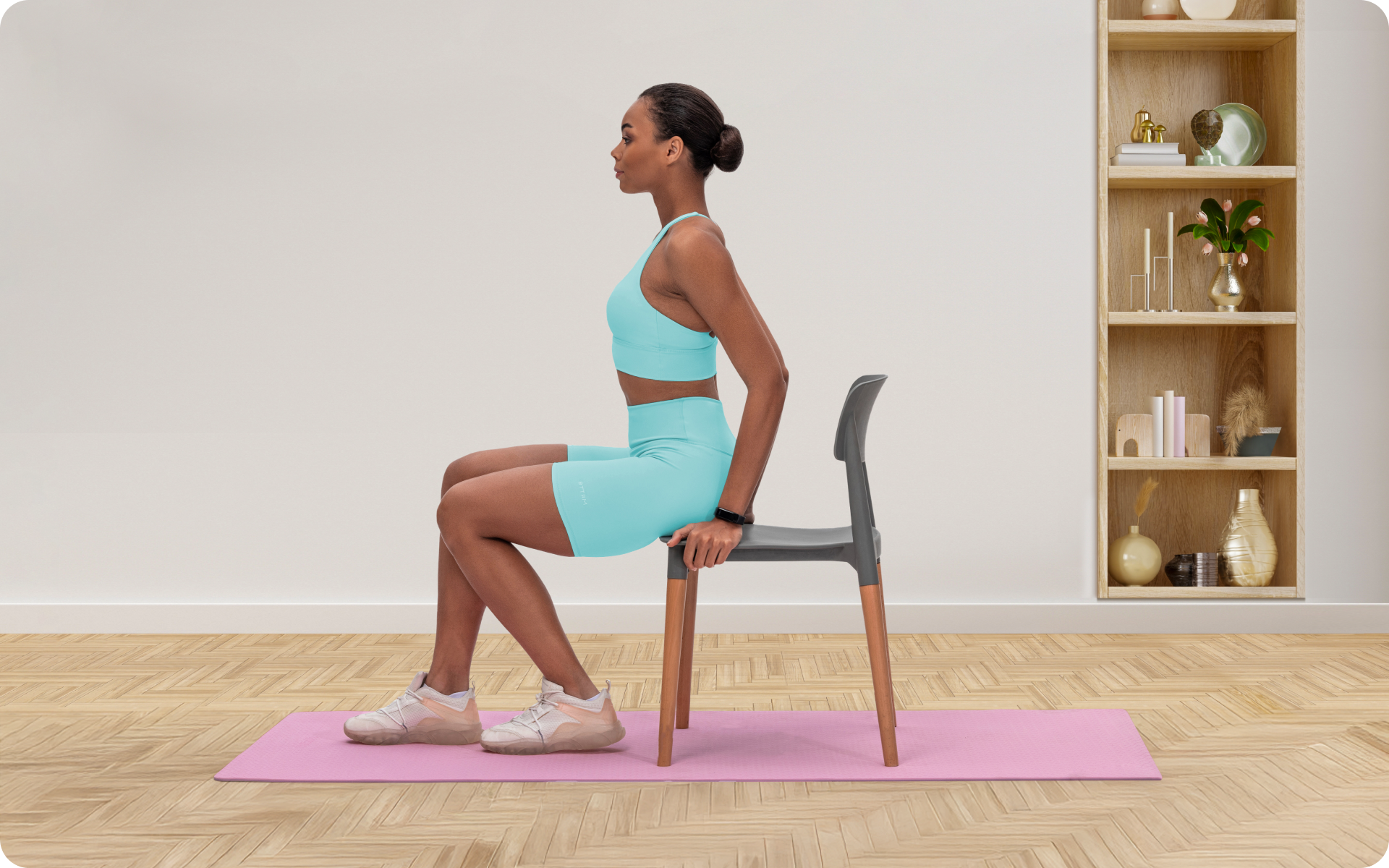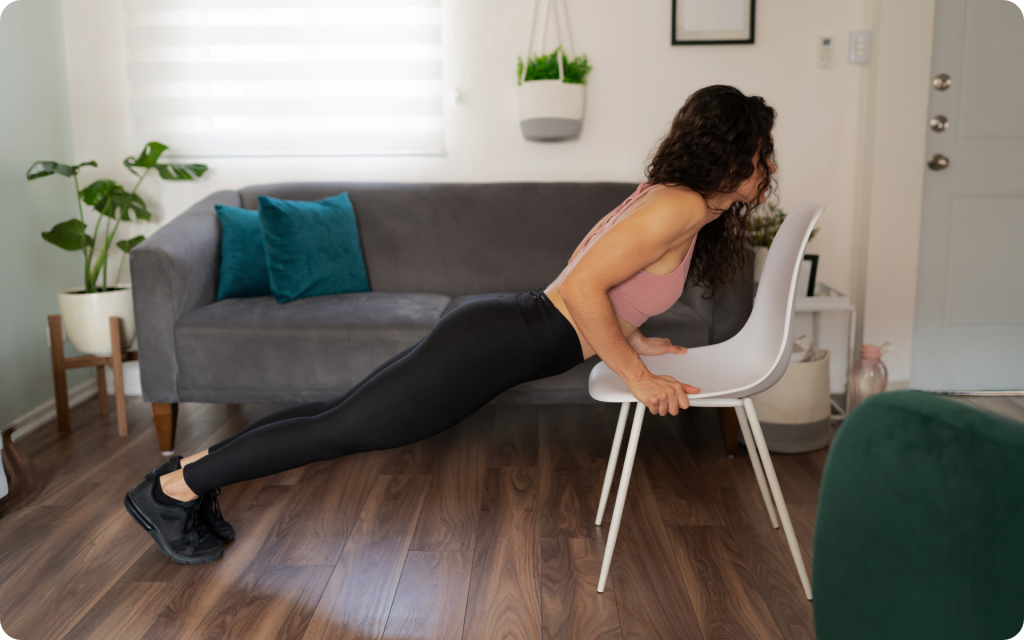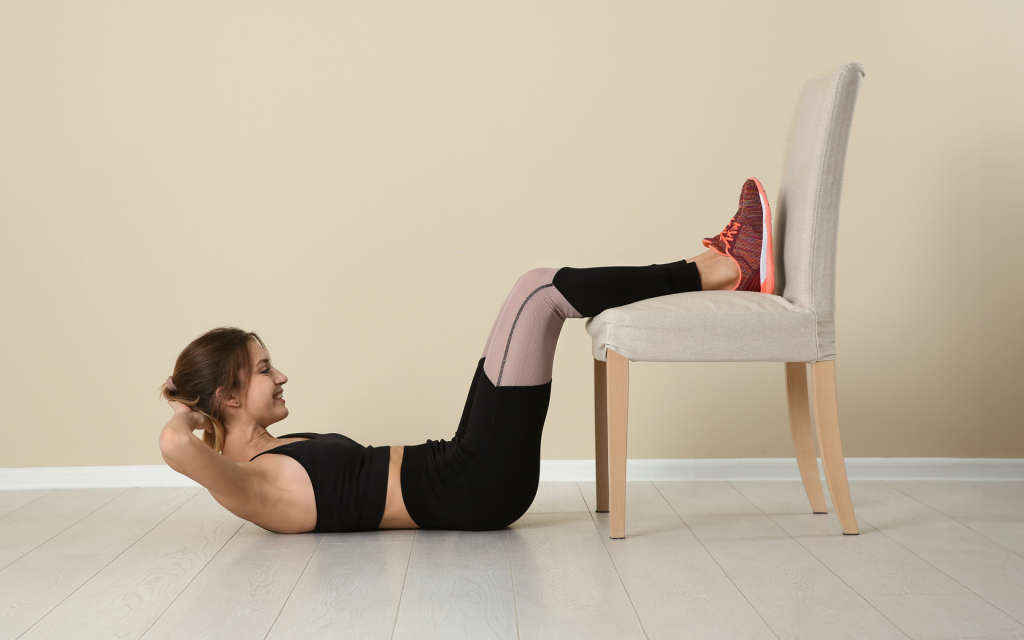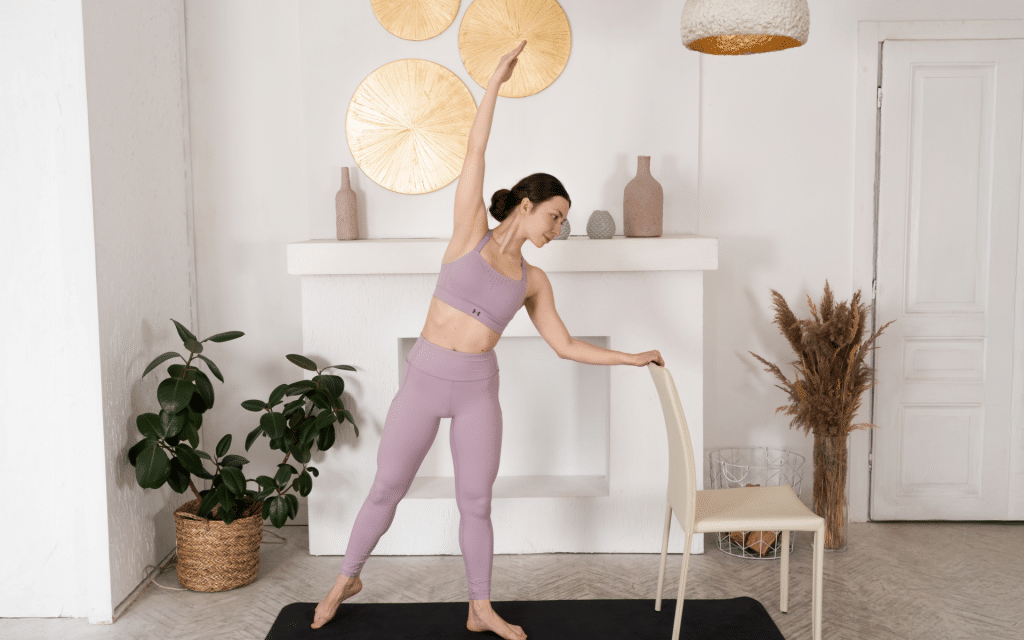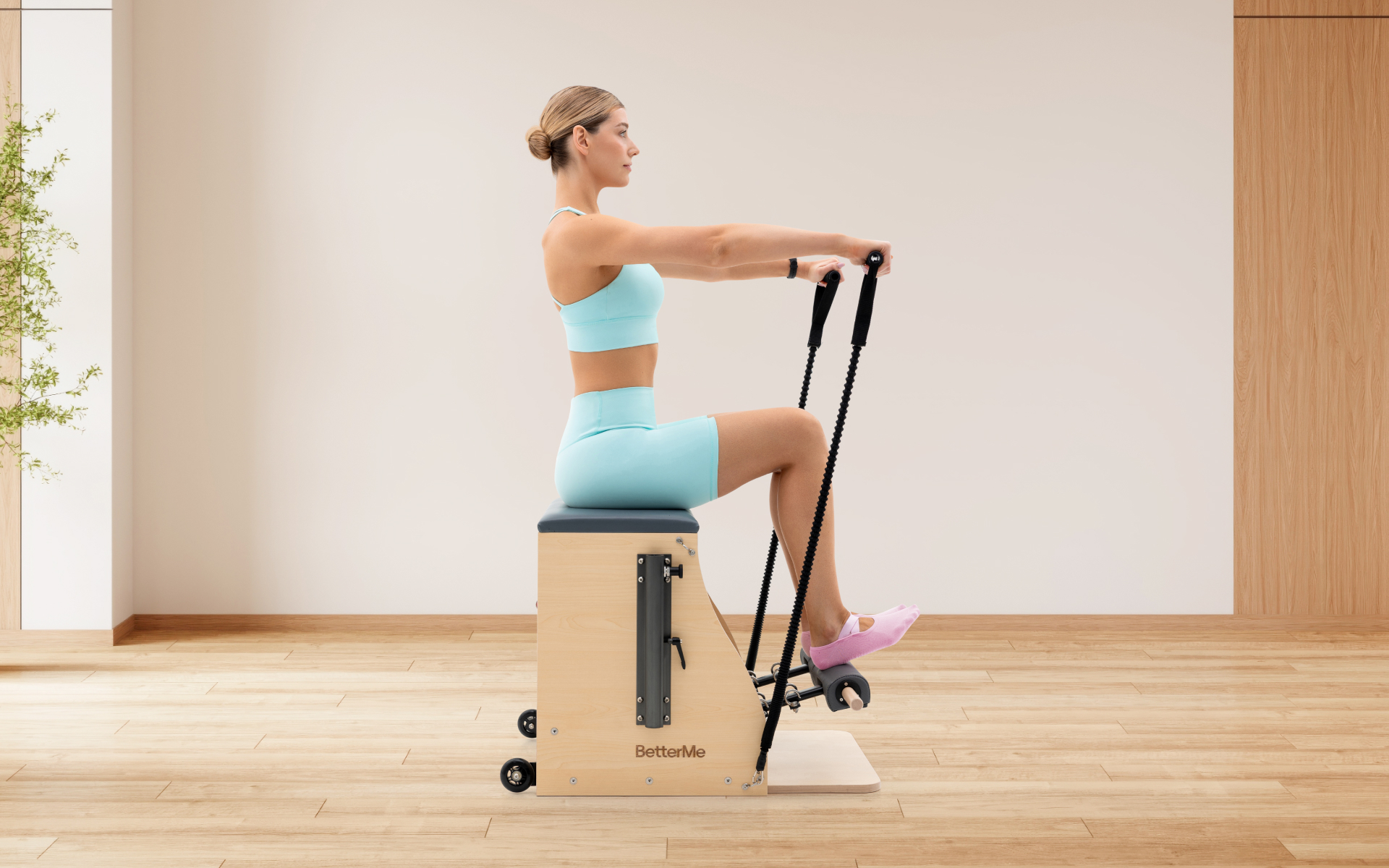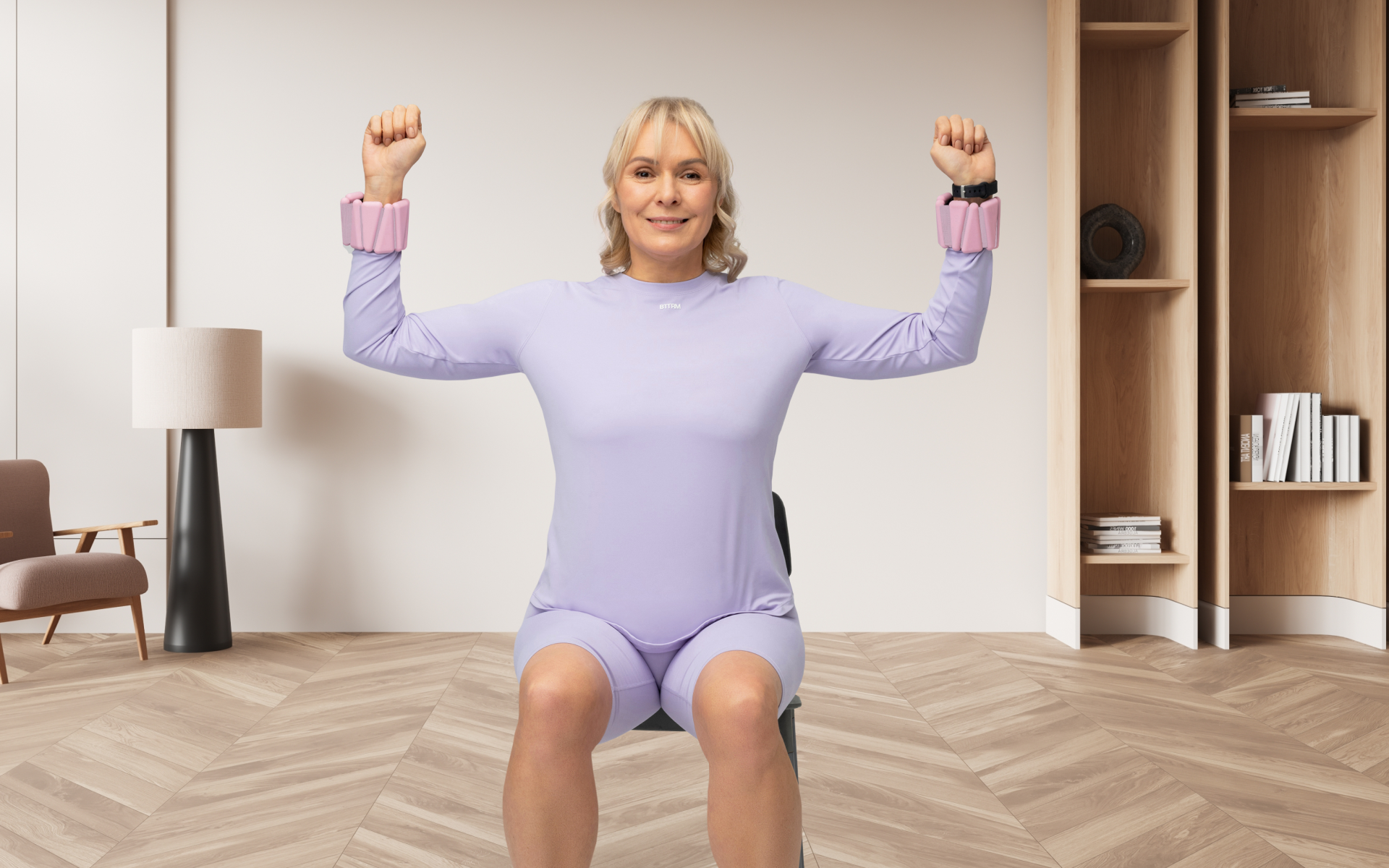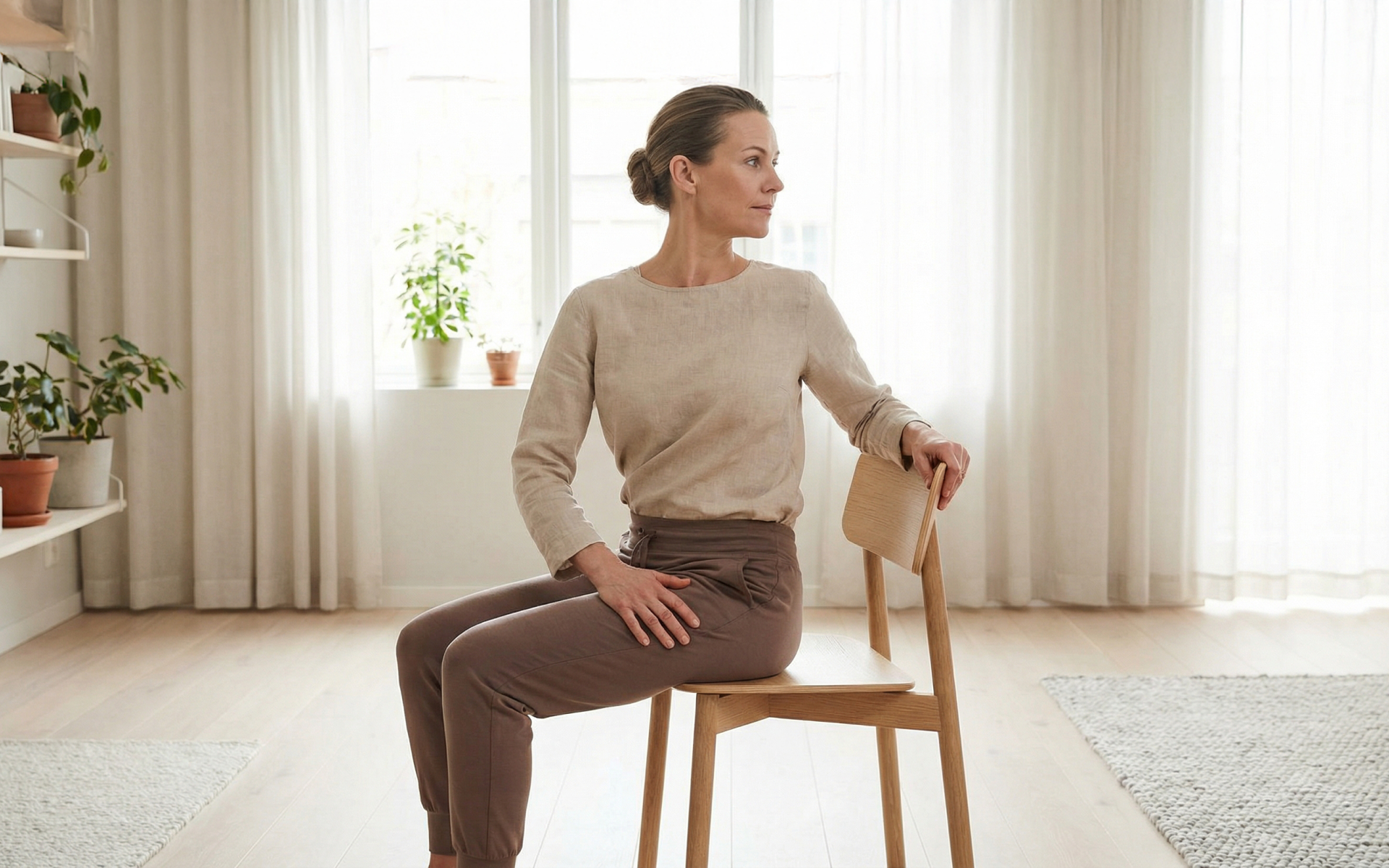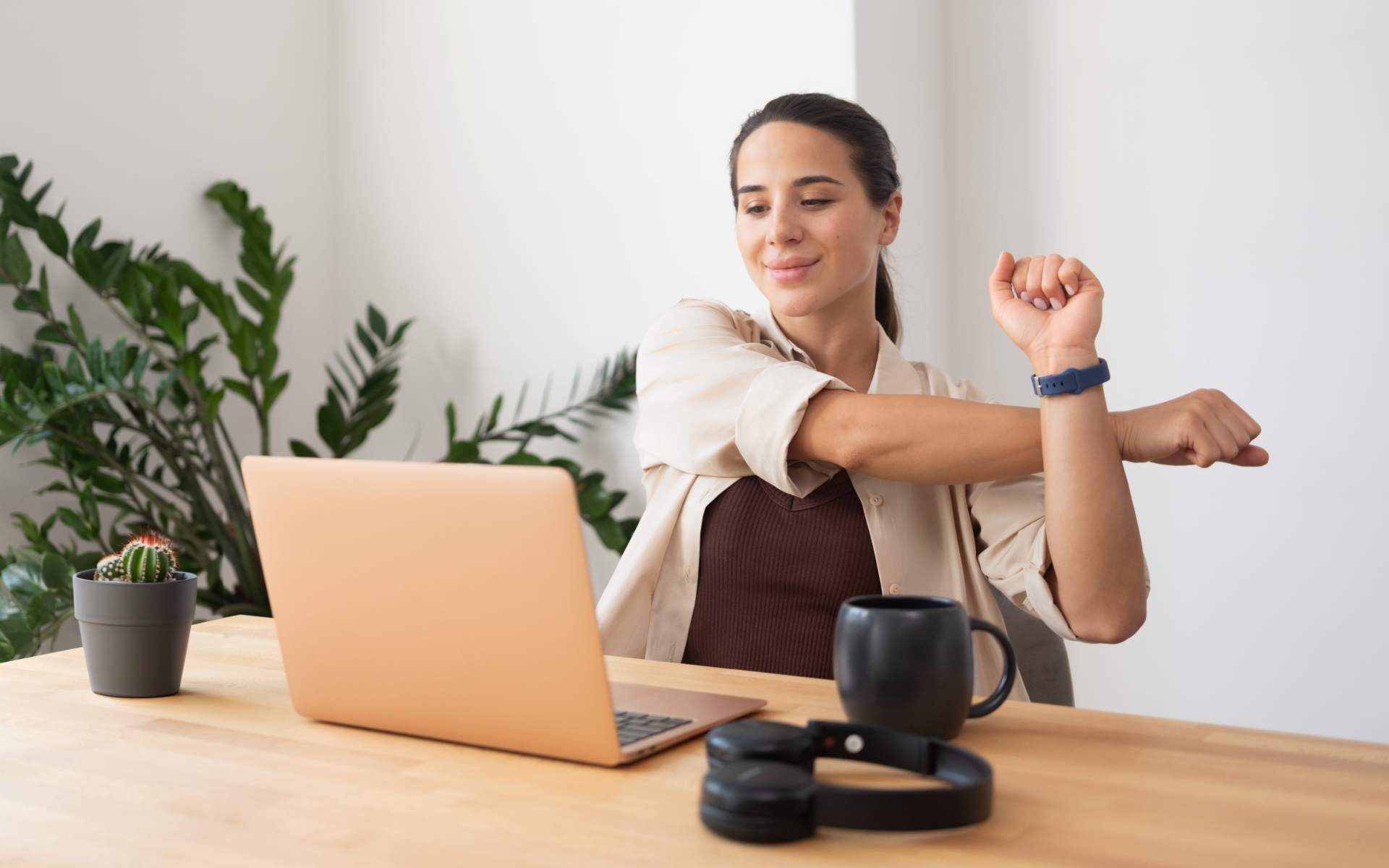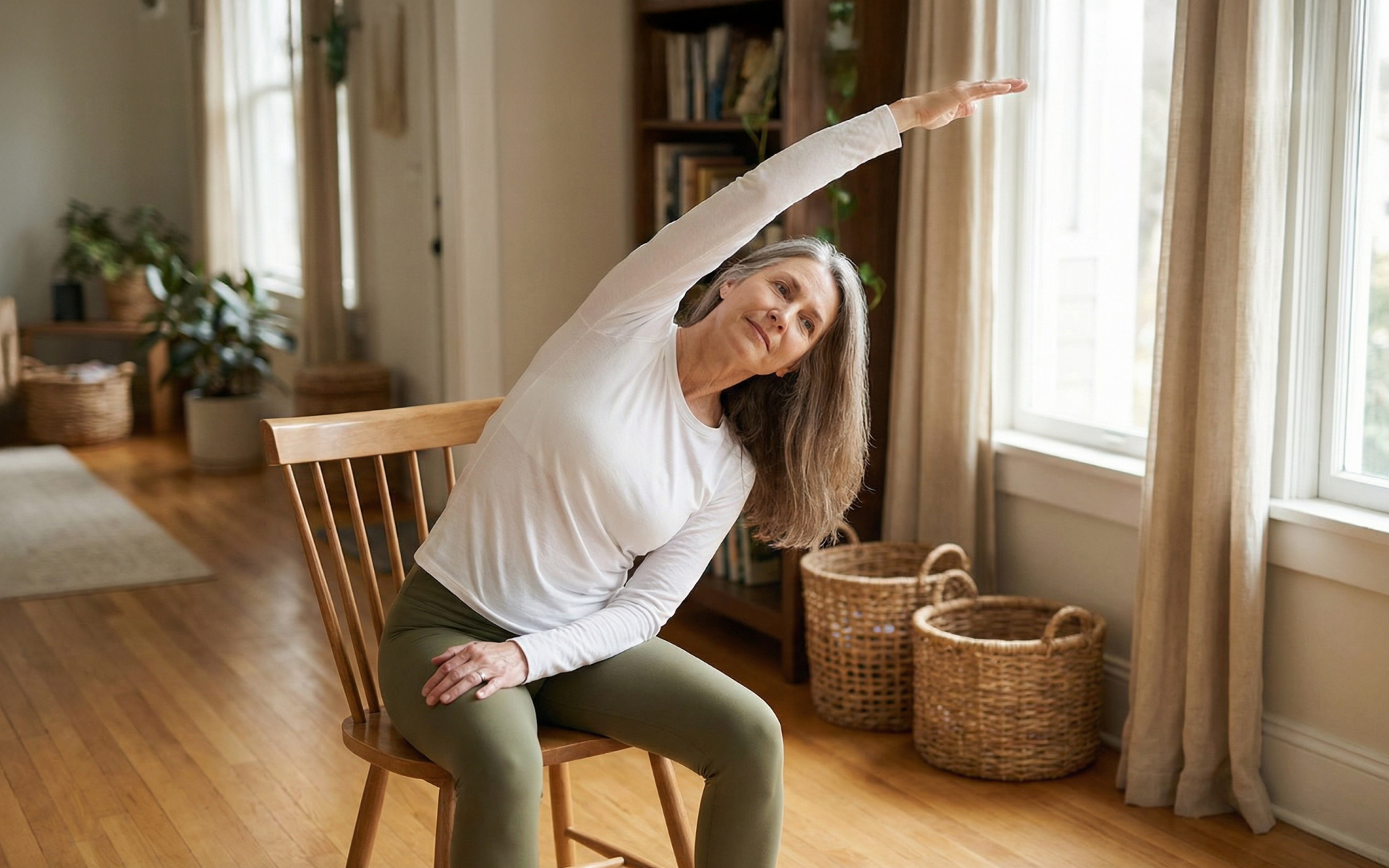Chair yoga is an easier form of traditional yoga that can be done while seated or standing and using a chair for support (1, 2). This alternative form of yoga has long been used by seniors as research has shown that it can help reduce stress levels, improve their physical function, reduce the risk and fear of falls, improve general physical fitness, and significantly enhance their quality of life (3, 4, 5).
But what about balance? Research has shown that you can use traditional yoga for balance improvements across all age groups (6, 7, 8), but can the same be said for chair yoga? Let’s take a look at how we can use this form of yoga for balance for seniors, in addition to the best chair yoga poses for balance for this demographic.
What Are Some Chair Yoga Poses for Balance?
Some of the most popular chair yoga poses for balance for seniors include:
- Chair tree pose
- Seated eagle pose
- Chair warrior
- Seated mountain pose
- Upward salute
We will explore these more later.
Does Chair Yoga Improve Balance?
Yes, chair yoga can help improve balance. The use of traditional yoga for balance improvement is nothing new (9). However, not everyone can do traditional yoga poses due to age or injury. This is where chair yoga comes in and studies have shown that this variation can be of immense help.
- In a study published in 2012, improved balance was one of the benefits experienced by older adults who participated in a chair-based yoga program twice a week for 8 weeks (10).
- In another study published in 2017, researchers observed that when psychiatric patients engaged in char yoga therapy sessions twice a week for 20 minutes over 12 weeks, there were significant improvements in their flexibility, hand grip, lower limb muscle endurance, and fall efficacy scale (11). Exercises that train your balance have been proven to help reduce the risk and fear of falls (12).
- In another study published in 2019, researchers found that increased agility and improved static and dynamic balance were some of the benefits that were seen after older women participated in a 12-week chair yoga program (13).
- A more recent study published in early 2024 also proved that older people can use chair yoga for balance. The chair yoga group in the study participated in twice-weekly sessions for 8 weeks. At the end of the study, researchers concluded that the chair yoga group showed improvements in their anxiety and depression scale and their balance and balance confidence was also improved (14).
All of these study findings show that you can use chair yoga poses for balance and strength, in addition to flexibility, agility, and better mental health in seniors.
BetterMe: Health Coaching app helps you achieve your body goals with ease and efficiency by helping to choose proper meal plans and effective workouts. Start using our app and you will see good results in a short time.
Can You Do Yoga If You Have Bad Balance?
Yes, you can do yoga even if you have bad balance. As shown above, studies have proven that yoga is one of the best exercises to help improve your balance. If you find it difficult to keep up with regular poses, here are some things you can do to help you slowly train your balance and stability, which will ultimately make it possible for you to engage in regular poses.
-
Start with Beginner Poses
It can be tempting to start your yoga journey with the more complex poses you see online. However, this can lead to injury, particularly if you have bad balance. Rather than attempting to copy the experts with their more complex moves, try something more beginner-friendly. By doing this, you can slowly train your stability, form, and alignment – all of which will help you do the more complex asanas in the long term.
-
Try Modified Poses
Sometimes, even beginner poses can be hard to do if your balance is bad. If this is the case for you, it can be easy to become frustrated and give up. Instead of this, find modified poses.
These are an easier version of regular beginner poses that will train you to a point where you can do regular beginner poses with ease. Don’t feel any embarrassment or shame in doing modified versions. Remember that patience and consistency can make even the impossible possible. Practicing your craft/exercise routine will make you perform better.
-
Use Props
Props are a great way to provide support in exercise. Some popular yoga props you can use include straps and blocks, which will help you achieve a deeper stretch and minimize the risk of injury when you’re attempting a variety of asanas.
If you don’t have the funds to buy props, you can use things you already have at home. A stack of books in place of a block or even a chair or wall work well when you need some extra stability.
Remember that chair yoga isn’t just for seniors. Standing chair yoga poses can be a great asset for younger people who have bad balance.
-
Do Coordination Exercises
These are workouts that help improve how different parts of your body work together. Research has shown that including coordination exercises in your workout routine can help with balance and is incredibly beneficial for cognitive function (15, 16, 17). Remember that a lot of workouts – even balance exercises – require you to move multiple body parts at once and sometimes in different directions. Better cognitive function and coordination can make it easier to do such workouts.
Read more: The Top 6 Benefits of Chair Yoga for Seniors
Is Yoga or Pilates Better for Balance?
It’s difficult to say. Some sources say that yoga is better, while others say that Pilates is the best option. As we’ve seen in the above-listed studies, doing yoga can help improve your balance. Studies on the effect of Pilates on balance in older adults have also shown that the exercise is also an effective option (18, 19).
So which option should you choose?
We say that you should choose the option that excites you the most as even the research that compares both options remains divided.
In a study on patients suffering from multiple sclerosis, researchers found that Pilates provided better results than the yoga program in terms of improving balance confidence, walking speed, and quality of life (20).
A more recent study on healthy fencers found both yoga and Pilates to have similar results in improvements of dynamic balance ability and functional movement, which would help prevent injuries and improve athletic performance. Researchers concluded that as both exercise options are effective, you should choose the option that best appeals to you (21).
Chair yoga for seniors may be a better option for older adults with musculoskeletal issues, but if they’re relatively healthy with none of these issues, either yoga or Pilates can be of use for balance and stability.
Read more: Chair Yoga for Upper Back: 10 Exercises that Can Help Relieve Tension
What Are Some Effective Chair Yoga Poses for Balance?
Here are five chair yoga poses for balance that beginners can use to get started:
Standing Chair Tree Pose
- Stand tall on the left side of a stable and study chair. Make sure there’s a little bit of space between your feet – don’t keep them together.
- Place your left hand on the back of the chair. Keep your chest lifted and core engaged.
- Shift your weight to your left foot and slowly lift your left leg to place your heel on your left shin.
- Place your right hand in front of your chest in a prayer position. If you can, bring your left hand up and off the chair to your chest to complete the prayer position. If this affects your balance, keep your left hand on the chair.
- Hold this position for 30 seconds or 5 deep and slow breaths.
- Slowly place your right leg on the ground, turn so your right hand is now on the chair, and repeat the process.
Seated Mountain Pose
- Sit on the chair keeping your feet firmly and comfortably on the ground.
- Move to the middle of the chair so you’re not leaning on the back of it. Keep your spine straight and your shoulders relaxed. Don’t hunch.
- Place your palms on your thighs/knees and close your eyes.
- Relax and simply pay attention to your breathing.
- Stay in this position for 30 seconds to a minute – or longer if comfortable.
Chair Upward Salute
- From the chair mountain pose above, drop both hands to either side of your body.
- On an inhale, push both hands straight and up toward the ceiling and then drop them back to your sides.
- Repeat this movement for 30 seconds.
- Maintain good upper body posture throughout the movement by keeping your shoulders relaxed, your rib cage sitting naturally over the hips, and your butt firmly on the chair.
Reasons why BetterMe is a safe bet: a wide range of calorie-blasting workouts, finger-licking recipes, 24/7 support, challenges that’ll keep you on your best game, and that just scratches the surface! Start using our app and watch the magic happen.
Seated Eagle Pose
- Sit on a stable chair. Make sure your feet are comfortably resting on the ground.
- Adjust your posture to sit upright at the edge of the chair. Rest your palms on your knees, with your feet together and flat on the ground, your knees directly above the ankles and in line with your spine, and your spine erect.
- Inhale and lift your right foot off the ground to cross it over your left knee. Use your hands to bring up your right foot. Try bringing your right thigh to rest on top of your left thigh. However, if this feels uncomfortable/painful, stop and adjust to where you’re most comfortable.
- Once the legs are situated, inhale and extend your arms out and in front of you. Exhale and cross your left arm over your right one at the elbows. Bend your elbows, allowing your palms to touch as if in a prayer position – or as close as they can come to each other.
- Stay like this for up to 30 seconds, then uncross your hands and legs and repeat the process on the other side.
Chair Warrior
- Sit sideways on the chair, facing to the left.
- Keep your right leg in position over the side of the chair and swing your left leg behind you.
- Plant the sole of your left foot on the floor roughly parallel to the seat of the chair and straighten your left leg.
- Keep your torso facing over your right leg and on an inhale, raise your arms to the ceiling.
- Hold this position for three to five deep breaths.
- Stand and switch sides to repeat this movement on the other side.
If you’re using the plan to improve your balance, then it will work – as shown in the studies mentioned above. Remember that you’ll need to practice patience and consistency to see results. It generally takes 4 to 6 weeks to see the initial results from any workout plan, so make sure to keep up with your training plan. Yes, chair yoga – both seated and standing poses – can help improve your balance over time. Yes, it is. Also known as Utkatasana, it’s a deep squat position that requires you to use your core and lower-body muscles to maintain stability and balance. This position may not be the best option for beginners, older adults, or people with hip, knee, or ankle joint issues. Yes, it does. There are 3 main types of exercises: aerobics, muscle strengthening, and balance and flexibility exercises (22, 23). Chair yoga, traditional yoga, and even Pilates fall in the balance and flexibility category.Frequently Asked Questions
Does the chair yoga plan really work?
Does chair yoga help with balance?
Is a chair pose a balancing pose?
Does chair yoga count as exercise?
The Bottom Line
Chair yoga poses for balance are an excellent option for seniors, beginners, people with injuries, or anyone who wants to improve their balance and flexibility but cannot perform traditional yoga poses. They’re a fantastic stepping stone that can help you learn your body better and improve your balance and flexibility, ultimately propelling you to greater heights and more complex asanas.
DISCLAIMER:
This article is intended for general informational purposes only and does not serve to address individual circumstances. It is not a substitute for professional advice or help and should not be relied on for making any kind of decision-making. Any action taken as a direct or indirect result of the information in this article is entirely at your own risk and is your sole responsibility.
BetterMe, its content staff, and its medical advisors accept no responsibility for inaccuracies, errors, misstatements, inconsistencies, or omissions and specifically disclaim any liability, loss or risk, personal, professional or otherwise, which may be incurred as a consequence, directly or indirectly, of the use and/or application of any content.
You should always seek the advice of your physician or other qualified health provider with any questions you may have regarding a medical condition or your specific situation. Never disregard professional medical advice or delay seeking it because of BetterMe content. If you suspect or think you may have a medical emergency, call your doctor.
SOURCES:
- Chair Yoga (2021, pubmed.ncbi.nlm.nih.gov)
- The Effectiveness of Chair Yoga in Older Adults: A Literature Review (2023, researchgate.net)
- Chair yoga: benefits for community-dwelling older adults with osteoarthritis (2012, pubmed.ncbi.nlm.nih.gov)
- Effects of a chair-yoga exercises on stress hormone levels, daily life activities, falls and physical fitness in institutionalized older adults (2016, sciencedirect.com)
- Effect of Chair Yoga Therapy on Functional Fitness and Daily Life Activities among Older Female Adults with Knee Osteoarthritis in Taiwan: A Quasi-Experimental Study (2023, pmc.ncbi.nlm.nih.gov)
- A Systematic Review of Yoga for Balance in a Healthy Population (2014, pmc.ncbi.nlm.nih.gov)
- The Effect of Yoga on Balance and Fear of Falling in Older Adults (2016, sciencedirect.com)
- Yoga-based exercise improves balance and mobility in people aged 60 and over: a systematic review and meta-analysis (2016, academic.oup.com)
- Effect of Yoga on Balance in Geriatric Population (2019, researchgate.net)
- Safety and feasibility of modified chair-yoga on functional outcome among elderly at risk for falls (2012, pmc.ncbi.nlm.nih.gov)
- Effects of chair yoga therapy on physical fitness in patients with psychiatric disorders: A 12-week single-blind randomized controlled trial (2017, pubmed.ncbi.nlm.nih.gov)
- The Effects of Physical Exercise on Balance and Prevention of Falls in Older People: A Systematic Review and Meta-Analysis (2020, pmc.ncbi.nlm.nih.gov)
- Effectiveness of Chair Yoga for Improving the Functional Fitness and Well-being of Female Community-Dwelling Older Adults With Low Physical Activities (2019, journals.lww.com)
- Reduced Anxiety and Depression and Improved Mood in Older Adults Living in Care Homes After Participating in Chair Yoga (2024, journals.sagepub.com)
- Effectiveness of coordination exercise in improving cognitive function in older adults: a prospective study (2011, pmc.ncbi.nlm.nih.gov)
- The Effect of Balance and Coordination Exercises on Quality of Life in Older Adults: A Mini-Review (2019, pmc.ncbi.nlm.nih.gov)
- Effects of 8-week endurance, strength, and coordination exercise interventions on attention in adolescents: a randomised controlled study (2024, tandfonline.com)
- Pilates exercise and postural balance in older adults: A systematic review and meta-analysis of randomized controlled trials (2020, pubmed.ncbi.nlm.nih.gov)
- The Effectiveness of Pilates Training Interventions on Older Adults’ Balance: A Systematic Review and Meta-Analysis of Randomized Controlled Trials (2023, pmc.ncbi.nlm.nih.gov)
- A comparative study of the effects of yoga and clinical Pilates training on walking, cognition, respiratory functions, and quality of life in persons with multiple sclerosis: A quasi-experimental study (2021, sciencedirect.com)
- Comparison of the Effects of Pilates and Yoga Exercise on the Dynamic Balancing Ability and Functional Movement of Fencers (2024, pmc.ncbi.nlm.nih.gov)
- Infographic: Three Types of Exercise and Physical Activity (2025, nia.nih.gov)
- Three Types of Exercise Can Improve Your Health and Physical Ability (2025, nia.nih.gov)
